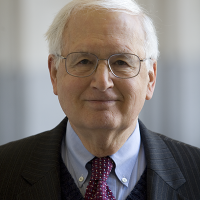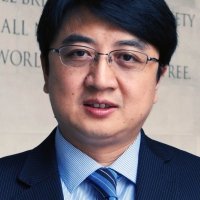A Decade of U.S.-China Relations: From Engagement to Rivalry
After nearly 40 years of mutually beneficial interaction, the United States and China face domestic, international, and ideological challenges that increasingly set them at odds. A relationship that has been both competitive and cooperative is now viewed as fundamentally competitive in Beijing and Washington alike. There is no precedent to guide Chinese and Americans in managing a geostrategic competition between wealthy, deeply intertwined, heavily militarized superpowers.
The Kissinger Institute celebrated the 10th anniversary of its founding with panel discussions on the evolution of U.S.-China relations over the past decade and new challenges facing the relationship in the Trump-Xi era.
** Since 2008, the Kissinger Institute on China and the United States (KICUS) has been committed to informed engagement between the United States and the PRC. Recognizing that the two nations have different values and interests does not preclude engagement; it requires that engagement be more resilient and responsive to strategic concerns. **
Selected Quotes
Robert Daly
“In the case of a rivalry, unlike in the case of enmity, a rival is someone who seeks the same thing that you do... you can’t both have it. In this case, the United States and China both desire to be the world’s preeminent nation. Their efforts are not aimed at each other in the first instance, as they are in the case of enemies, but they find themselves increasingly at cross purposes.”
“It’s hard to overstate how profoundly successful academic relations have helped both nations. This one is a true win-win, but now we’re told that university activities have become a threat to American national security, and the accusation here is related to the early discussion that engagement with China has been a sucker’s game, that we have been played by China in all of this… [The National Science Foundation says] the benefit is 80/20, 80% to China, 20% to the U.S. Does that make it a sucker’s game? No, not from the point of view of the scientific community, because America still got a 20% benefit that it otherwise would not have had, and knowledge is universal, so America’s scientific community sees this as an acceptable state of affairs.”
Hank Levine
“The burden of proof on those who say [China’s WTO entry] was a mistake is to show that the United States, and, for that matter, the world, would have been better off keeping China out of the global trading system. They can assert that it’s the case if they want, and many do assert that, but that’s all it is, an assertion. I don’t think it can proven… U.S. companies have generated billions of dollars in revenue as a result.”
“If you’re trying to create an environment in which you’re trying to negotiate and move forward and solve problems, what is the point of gratuitously poking a stick in the eye of China? What is the value in that? Not to mention, it overlooks that the [WTO entry] was a tough negotiation and we have gotten a lot of benefit from it.”
Yun Sun
“U.S.-China relations have a floor, but they also have a ceiling; no matter how this relationship evolves, there is a maximum extent to how good it can be, and there is also a maximum extent to how bad it can be. What has changed since the Trump administration is that the Chinese are reaching the conclusion that there might be a ceiling, but there is no floor.”
“[From the perspective of] Beijing and the China policy community, I think what they are seeing is disproving their earlier expectation about the Trump administration. Their earlier expectation was that Trump is looking for a deal, Trump is not looking for a fight, but now they have come to the conclusion that maybe Trump is not looking for a deal. He is looking for a fight.”
Benjamin Creutzfeldt
"Scholars in China recently published a list of the 60 centers for Latin American studies that have opened up in China in the last couple of years. That is something that, clearly, China is aware it has shortcomings that it needs to learn better to engage. Also, with minority peoples, it has difficulties with them in its own country, and confronts surprise difficulties in Latin America when it engages there with civil society groups and so on. This is not so easy to square with what they sell as a mutually beneficial, collaborative, mutually supportive partnership.”
“The new name for China’s foreign policy may be [Belt and Road Initiative] and simply, everything is packaged within that. Companies have learned not to bid independently for infrastructure projects, but to go into joint ventures with local companies, and there they have been more successful and can be financed more easily from China or supported more easily within the BRI framework. That may be the idea.”
Laura Dawson “One of the great instruments we have for managing the [U.S.-China] relationship is the WTO. [It is] better to have a rules-based system than to not have a rules-based system, even if it does not work particularly well. Attempts to get rid of the WTO or remove the U.S. from the WTO, I think, would be very detrimental, not just for the global trading system, but also for that particular relationship with China.”
“In the absence of a strong policy of ‘thou shalt or thou shalt not,’ [Canada] has been going on a case-by-case basis of remembering that Chinese activity in Canada is governed by Canadian laws, and so it is only as good or bad as Canada’s ability to monitor what is actually happening.”
Jennifer Turner
“A lot of U.S. cities and states are looking to cooperate with China on climate issues, California taking the lead, of course. California’s foreign policy with China has been quite aggressive on promoting cooperation. In fact, right after the U.S.-China Climate Agreement was signed, Los Angeles hosted the U.S.-China Climate Leaders’ Summit… There’s definitely a lot of romance between U.S. and Chinese cities, talking on energy and climate issues.”
“Now, the environment and energy cooperation that we had before appears to be off the table for discussion. A lot of people in my network feel high disappointment because it was a kind of flourishing era of cooperation.”
Aynne Kokas
“These are films that are being designed for access to the Chinese market, which means Chinese content-regulators have increasing control over what types of films are being made in Hollywood, even when they’re not actually being made in China… So there’s this shift in terms of the types of movies we see in multiplexes that are actually being designed for the Chinese markets.”
“As there is this closing of the domestic system, we see the expansion of infrastructure by Chinese-government-affiliated companies like Huawei.”
Zheng Wang
“The concern [about foreign influence] reached the highest point, I believe, in 1989. I think many of the Chinese leaders at that time and Chinese nationalists believed it [was] a failure because they thought, ‘The students have been influenced by the Western and U.S. ideologies’ and they went to the street protesting, so they consider this a major failure.” “I think the discussion should be ‘What exactly is the China model? What are the real ideas China can give to the outside world?’ If we talk about China’s prosperity, if we measure it by GDP, we can, of course, say China has been successful. If we talk about the secret of China’s success, I think the secret is China decided to conduct economic reform and to follow the market economy. Rather than something else, today’s prosperity is coming from the reform China conducted forty years ago.”
--------------------------------------------
Conference Agenda
1:00-1:10PM Welcome & Introduction Robert Daly, Kissinger Institute, Wilson Center
1:15- 2:15PM Economic Relations: Win-Win to Predation? Hank Levine, Albright Stonebridge Group Yun Sun, The Stimson Center Moderator: Dinny McMahon, The Paulson Institute and Former Wilson Center Fellow
2:20-3:20PM Chinese Policy in the Americas: The Arctic to Tierra Del Fuego Benjamin Creutzfeldt, SAIS Foreign Policy Institute and Wilson Center Fellow Laura Dawson, Canada Institute, Wilson CenterJennifer Turner, China Energy & Environment Forum, Wilson CenterModerator: Ambassador J. Stapleton Roy, Kissinger Institute, Wilson Center
3:25-4:25PM Issues of Influence: From Engagement to SuspicionRobert Daly, Kissinger Institute, Wilson CenterAynne Kokas, The University of Virginia and Former Wilson Center FellowZheng Wang, Seton Hall University, Wilson Center Global FellowModerator: Sandy Pho, Kissinger Institute, Wilson Center
4:30PM Closing Remarks Robert Daly, Kissinger Institute, Wilson Center
Moderators


Founding Director Emeritus, Kissinger Institute on China and the United States
Panelists

Executive Director, Future Borders Coalition

Visiting Professor, Sabana University (Bogota, Colombia) & Non-resident Fellow, SAIS Foreign Policy Institute, Johns Hopkins University


Associate Professor of Media Studies, University of Virginia and Senior Faculty Fellow, Miller Center for Public Affairs.


Professor, School of Diplomacy and International Relations, Seton Hall University
Hosted By

Kissinger Institute on China and the United States
The Kissinger Institute works to ensure that China policy serves American long-term interests and is founded in understanding of historical and cultural factors in bilateral relations and in accurate assessment of the aspirations of China’s government and people. Read more
